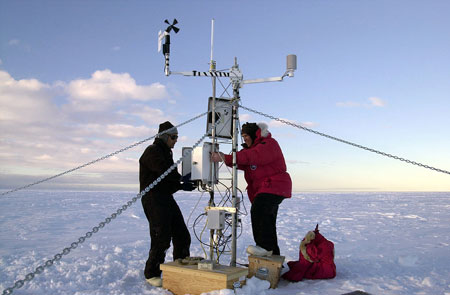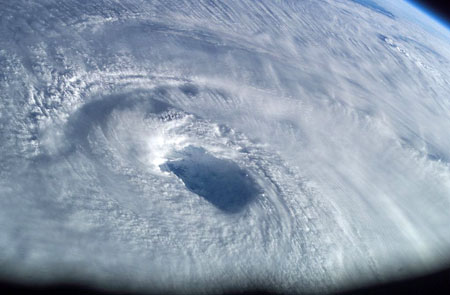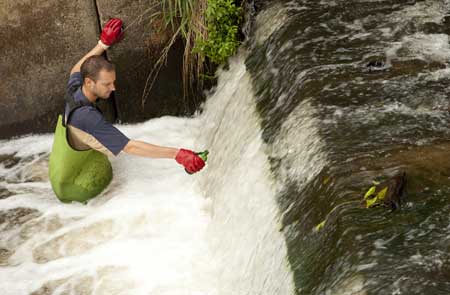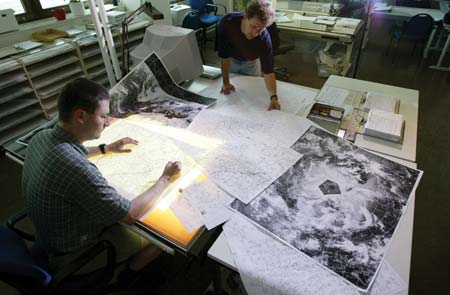What meteorologist and hydrologists do, and how to get a job as one
 ©
Josh Landis, National Science Foundation
Weather instruments such as this device installed upon Iceberg B-15A provide scientists a better understanding of Antarctica's impact upon global climate.
©
Josh Landis, National Science Foundation
Weather instruments such as this device installed upon Iceberg B-15A provide scientists a better understanding of Antarctica's impact upon global climate.
Interested in a career in science? You're in luck.
Early career scientists are in great demand.
Demand for skilled professionals in the area of meteorology and climatology is on the increase, especially in developing countries where development is often set back by repeated weather and climate-related disasters.
In fact, the science community is concerned: many established researchers plan to retire in the coming decade and there are not enough early and mid-career researchers ready to take their place. Unless young scientists are encouraged, trained and mentored in various scientific fields knowledge gaps will occur. This is especially true as the growing and urbanizing global population, confronted with the limited resources of a finite world, faces exceptional weather and climate related vulnerabilities.
More emphasis is also being placed on attracting women into the sciences in order that they be properly represented in the field.
A career in meteorology offers many opportunities. Consider this rare profession today.
Downloads:
A career in meteorology [PDF]
Related links:
Women in Meteorology – Profiles and stories
Association of Polar Early Career Scientists
The highs and lows of being a flight meteorologist
 ©
Mike Trenchard, Johnson Space Center.
Astronaut Ed Lu captured this image of the eye of Hurricane Isabel as he passed overhead in the International Space Station on September 15, 2003. The storm had weakened somewhat, but still maintained its status as a Category 4 hurricane.
©
Mike Trenchard, Johnson Space Center.
Astronaut Ed Lu captured this image of the eye of Hurricane Isabel as he passed overhead in the International Space Station on September 15, 2003. The storm had weakened somewhat, but still maintained its status as a Category 4 hurricane.
Meteorology uses physics, mathematics and chemistry to understand the atmosphere and its phenomena, including weather and climate.
No one can really claim to be the first meteorologist. Predicting the weather has always been essential to humanity's survival.
Long before modern science, watching the sky and other methods like observing the flight of birds were ways of predicting the weather.
As societies developed, however, humans began to study the weather and seasonal changes in the wind (such as the monsoon), which were essential for travel or trade and their subsistence.
Records of early civilizations contain innumerable references to weather and climate. It was not until 1657, however, that Grand Duke of Tuscany Ferdinand II di Medici established the first recorded international meteorological network. His Accademia del Cimento set up seven weather stations in Italy, and one each in France, Germany, Poland and Switzerland.
Related links:
A world of weather video
 ©
Photodiem
A hydrologist takes water samples
©
Photodiem
A hydrologist takes water samples
Hydrology is the study of water on Earth – its quantity and its quality, where it is and how it moves.
Hydrologists are scientists, engineers, or professionals who monitor, manage and protect our water resources.
The work of a hydrologist is as varied as there are sources and uses of water.
Do you know anyone who is a hydrologist? Write about what they do and add it to the stories page.
Related links:
UN Water
World Water Day
 ©
Deutscher Wetterdienst (DWD)
Weather forecasting
©
Deutscher Wetterdienst (DWD)
Weather forecasting
To become a meteorologist, the basic requirement is to earn a university degree in meteorology or atmospheric sciences. Another option would be a university degree in mathematics, physical sciences or engineering supplemented by courses in meteorology.
To be a hydrologist also requires a minimum of a bachelor’s degree – either directly in hydrology, or in water resources science, geoscience, natural science or engineering.
Teaching, research or management positions in meteorology or hydrology usually require postgraduate degrees.
Meteorological technicians, who may not possess an academic degree, are generally responsible for collecting data and reporting weather observations. They can qualify through technical-level courses that last from a few months to one or two years, depending on the envisaged work.
If you would like to become a television weather presenter, then journalism and communication courses are necessary in addition to a good knowledge of atmospheric physics and chemistry. These are but a few examples of possible careers in meteorology.
Other related careers include: environmental engineer, water resources engineer, conservation scientist, climate change analyst.
Downloads:
A career in meteorology [PDF]
Related links:
The highs and lows of being a flight meteorologist